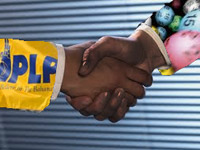 Top business leaders are questioning the economic value of legalized gambling and web shops, but arguing that the “underground industry” must be regulated to keep such behavior in check.
Top business leaders are questioning the economic value of legalized gambling and web shops, but arguing that the “underground industry” must be regulated to keep such behavior in check.
Franklyn Wilson, chairman of Sunshine Holdings Limited, said web cafes are simply a way for money within the country to “change hands”. He said the legalization of the industry would not stimulate considerable growth in the economy.
“There is no economic benefit to gambling to truly create meaningful economic activity,” he told Guardian Business. “I don’t see any case of that. In fact, I would say the reverse is true. The underground economy exposes the country to serious attacks.”
The strong comments from one of the country’s leading businessmen follow the Christie administration’s postponement of the now notorious gambling referendum. Amid considerable public confusion, the government has pushed the date to late January and introduced new questions on the ballot, such as the possible introduction of a national lottery.
James Smith, a key advisor to the Christie administration, admitted that the shutting down of gambling houses would be a big hit to employment. He estimated that, if up to 4,000 Bahamians work in the gambling industry, that three percent of the workforce would be lost.
However, he questioned whether a regulated and legalized web cafe experience should be touted as having major economic potential.
“Gambling is not really economic activity,” he said. “It doesn’t create value. Ten people in a room gambling is just $100. It’s just money changing hands.”
The former state minister of finance noted that taxes on web shops are expected to be funneled into social programs. However, he told Guardian Business that money for the community should come from the community itself, without placing a “disproportionate load on the gamblers”.
Wilson said the crucial difference between web shops and casinos is the fact that only Bahamians are involved in numbers. In other words, no new money is coming in and being circulated.
But while Wilson pointed out these limitations, he said the only solution is legalization and tight regulation to keep the “underground economy” in check.
“If you drive it further underground through a no vote, it exposes it to other forces, such as drugs, prostitution and serious corruption,” he explained. “The logical response to this matter is to accept some people will gamble. If you accept that, we must seek to convince these people that the behavior is bad and encourage them to stop. That is a strong case for regulation. Bring it into the sunshine and out in the open.”
Dionisio D’Aguilar, a former head of the Chamber of Commerce, has made his opinion known that web shops need regulation. If the motion is defeated, the government would have a hard time, he added. He felt it was unlikely that the government could indeed shut the operations down.
Whether the country votes yes or no, the impact will no doubt be felt in the national economy. The government has assigned January 28 as the new date for the gambling referendum.
By Jeffrey Todd
Guardian Business Editor



